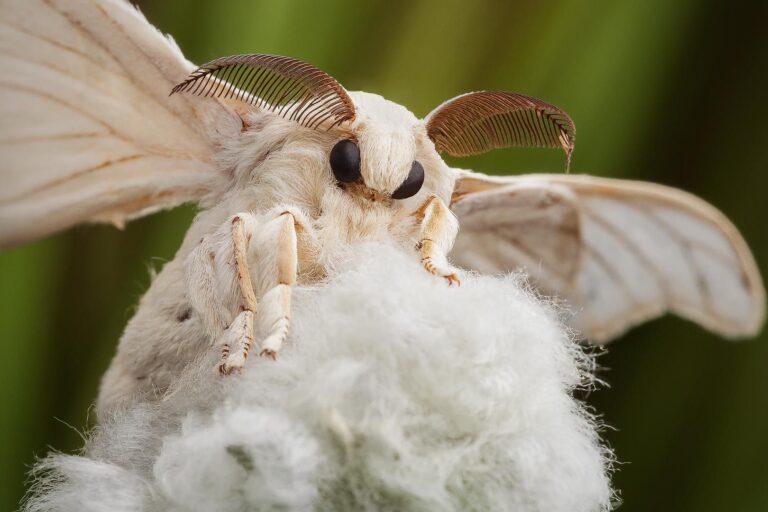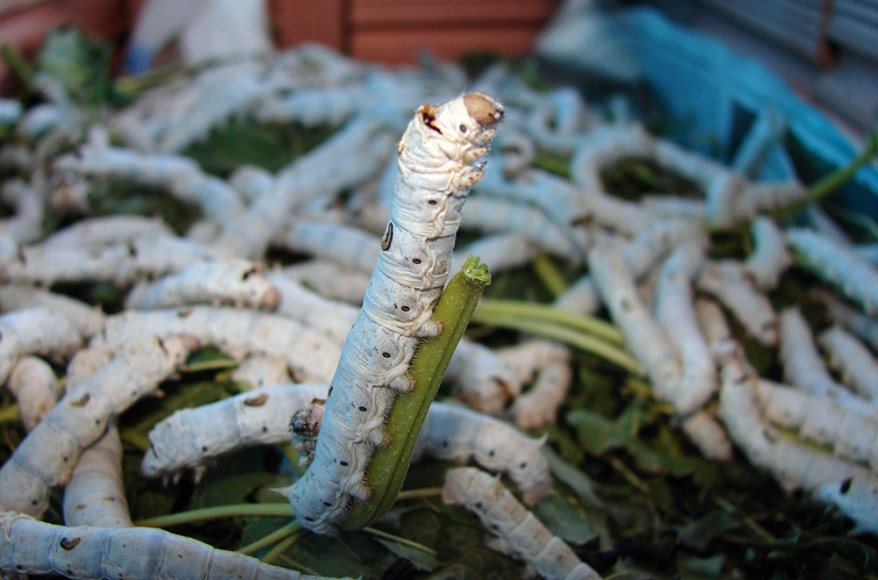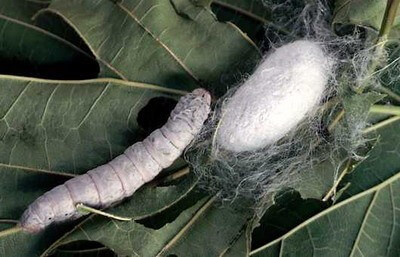- [email protected]
- National Animal Rights Association, Suite 10684, 26/27 Upper Pembroke Street, Dublin 2, D02 X361.
Silk
Silkworms are boiled alive for their silk - all for the sake of fashion.
The silkworm is the larva or caterpillar of the Bombyx mori moth.

Female silkworms lay about 500 eggs at a time. They lay their eggs on the leaves of mulberry trees. The eggs are covered with gelatinous secretion by which they stick to the leaves. Male moths are simply discarded by the industry after they mate.
Silk is the fibre that silkworms weave to make their cocoons – outer casings that protect them during the pupal stage.
The cocoon is made of one thread of raw silk from 300 to 900 meters (1000 to 3000 feet) long.
Normally, after spinning their cocoon, they will make a hole in it when it is time to exit as a moth. This would, obviously, cut the threads and ruin the silk – so the industry throws them into boiling water alive, killing the silkworms and making the cocoons easier to unravel. Often, the dead silkworms are then sold for consumption.

“Commercial” silks originate from reared silkworm pupae, which are bred to produce a white-colored silk thread with no mineral on the surface. Due to the genetic interference by humans, they cannot survive in the wild.
Around 6,600 silkworms are killed to make just 1 kilogram of silk.

Like all living creatures, silkworms produce endorphins and have a physical response to pain. Just because they do not show fear or pain the way other animals do, doesn’t mean that they aren’t experiencing it.

Today, around 125,000 metric tons of silk is produced in the world.
“Ahimsa silk”
Although the industry claims that this form of silk harvesting is cruelty-free, it still involves the use and exploitation of sentient creatures.
Furthermore, no certification or inspection authority exists to guarantee that the silkworms are not killed during the silk harvesting.
Even if some silk producers don’t boil them, they may still cause them to suffer by providing them with inadequate food or forcing them out of their cocoons prematurely.
The animal-welfare group, Beauty Without Cruelty – India, observed one producer consigning female moths to trays for egg-laying while, the males were put into a refrigerator, brought out occasionally for breeding and then thrown away when they were no longer able to mate.
Make sure you never support this cruelty when shopping.
Support a ban on the silk industry!

So, what are we doing about it?

Protests
Even when we are protesting fur shops, we make it clear that we are equally as opposed to silk, leather and wool too. As soon as we get real fur out of Ireland, silk, wool and leather are next on our agenda. Are you ready to join the campaign? Email us now!

Awareness
The majority of people we encounter are unaware that silk comes from a worm who is boiled alive. We raise awareness on this through vegan outreach, so that people avoid buying it.

Lobbying
We would like to see a ban on the importation and sale of silk in Ireland, and it will need political lobbying to make this happen.
We have various campaigns running at any one time. Please click to learn about more issues!
NARA is a legal, grassroots level organisation that only operates within the law. Information on this website is for the purpose of legal protest and information only. It should not be used to commit any criminal acts or harassment. NARA is not affiliated to any other animal rights group. NARA has no links or involvement with the Animal Liberation Front or the Animal Rights Militia. Any articles published on this web site relating to illegal activities are posted for the sole reason of publishing news related to animal rights, and are not intended to incite or encourage similar acts.

CONTACT
- [email protected]
- National Animal Rights Association, Suite 10684, 26/27 Upper Pembroke Street, Dublin 2, D02 X361.
Copyright © 2024, National Animal Rights Association.
